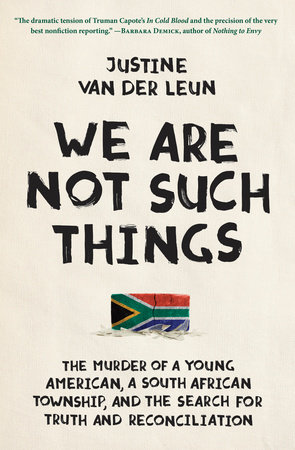Well that was a long and frustrating book. The New York Times review of Justine van der Leun’s We Are Not Such Things promised that the book would “overturn” the traditional narrative of Amy Biehl’s death, and in the process expose the weaknesses of the famed and beloved South African Truth and Reconciliation Commission.
In case you aren’t familiar with Amy Biehl’s story (I wasn’t), she was an activist and Fulbright scholar who was attacked and murdered in the South African township of Gugulethu in 1993, on the eve of apartheid’s demise. Four men were convicted of her murder, then later pardoned under the terms of the Truth and Reconciliation Commission (TRC), which offered amnesty for political crimes in exchange for full public disclosure. Biehl’s parents publicly offered forgiveness to her killers and even employed two of them at the Amy Biehl Foundation Trust, which they established in South Africa to empower township youths.
Van der Leun’s efforts to uncover the story of what happened on the day of Amy Biehl’s murder are tireless. She’s able to track down and speak with an impressive number of the people involved — police, suspects, witnesses — although twenty years on, they rarely have much of substance to add to official accounts. The thrust of Van der Leun’s argument seems to be that neither the South African criminal justice system in 1993 nor the political and social systems in of the present day are perfect. Which, I mean — yeah? Systems are flawed? I don’t know that I needed to spend 500 pages navigating class divisions in South Africa in order to be convinced of that.
As a travel writer, Justine van der Leun evokes the people and places of poverty-stricken South Africa incredibly well. Well, but at incredible length. We spend page after page on the family drama of one of the convicted killers, Easy Nofemela, and don’t get me wrong: He’s a wonderful character in van der Leun’s telling. It’s just not clear why, in a book ostensibly dedicated to unpicking the many threads of Amy Biehl’s 1993 murder, so many chapters are dedicated to Easy and Justine driving around shooting the shit.
Though the book is certainly overlong and could have done with being shortened by about a third, I think expectations were also a factor in my unenjoyment. Many South Africans have grown critical (or always were) of the TRC’s work, and I hoped that van der Leun would bring to light some of these criticisms and how the TRC’s failings continue to affect South African lives. That isn’t this book, and it’s not clear that van der Leun even wanted it to be.
My love for scholarship on restorative justice remains undimmed, however! While I was reading this, I also dipped in and out of Priscilla Hayner’s classic text on truth commissions, Unspeakable Truths, and it is just as excellent as I remembered. What a fascinating subject.
POLL TIME! Who here knew who Amy Biehl was when I first mentioned her name? And secondary question, this one for millennials only: Were you aware of apartheid as a kid? I totally was not, and it’s really weird to think that that was still going on when I was in grade school.
